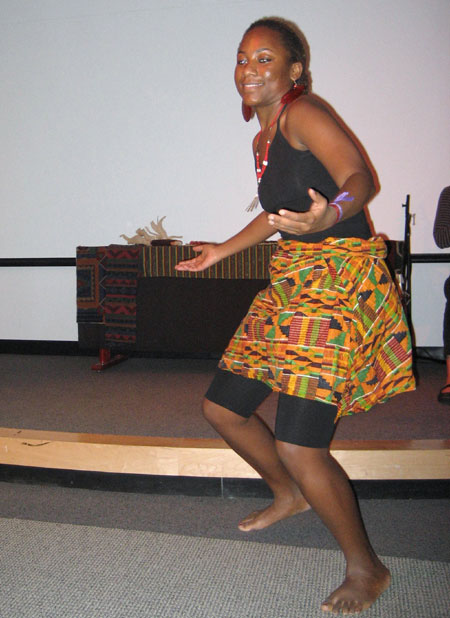
Education is power, and power should always be used to the best advantage for people. The value of education is that it gives you an opportunity to be heard, said Rolanda Pierre Dixon in her remarks at Mission College’s third annual Kwanzaa celebration November 30.
The retired former Assistant District Attorney for Santa Clara County, who established the first domestic violence unit in the county in 1991, addressed about 100 people who had gathered to celebrate Kwanzaa, a national celebration honoring the cultural heritage of those of African descent.
It has all been really easy because I had the education. I’ve been places I thought I’d never be, says Dixon, a black woman raised by a single mom whose four daughters all earned graduate degrees.
Dr. Worku Negash, Mission College Vice President of Administrative Services and chair of the Ethiopian Community Services agency in San Jose, also spoke of being raised in a family that valued education and helping others.
It’s a major value of African communities that you have to give to others not as fortunate as yourself, says Negash. He plans to retire at the end of the 2011 – 2012 school year and return to his home country of Ethiopia, where he will work to strengthen the University College that he helped start in Addis Ababa in 2007.
Kwanzaa means first in Swahili and is taken from a phrase meaning first fruits. It began in the U.S. in 1966 and is observed December 26 through January 1. Daily family libations (rituals) highlight the Nguzo Saba, the seven guiding principles of African culture—unity, self-determination, collective work and responsibility, cooperative economics, purpose, creativity, and faith.
At Mission College’s early celebration, students and faculty performed the Kwanzaa rituals. Instructor, counselor, and poet Donnell McGee opened the ceremony, inviting elders to be seated in front. He recited his poem Slave Not.
Guardians of the Word drummers Merry Jung, Mach One, and David Piper maintained a steady beat for the opening and closing procession of dancers Alexandra Hill, Diana Tio, and Vianji de la Cruz. Ademola Bolarinwa dramatized pouring water on a plant and, in the African language Yoruba, thanked ancestors for providing for everyone. The mishumaa (seven candles) were lighted, each representing a core African cultural value. A peace drumming ended the celebration.
Mission College instructor David Piper, whose Humanities 18 Class 2011 helped sponsor the Kawanzaa celebration, hopes it will reinforce the importance of multiculturalism in education.
We’re making good progress with introducing more multiculturalism into the curriculum at Mission College, says Piper.
The Kwanzaa celebration was also sponsored by Mission College’s Umoja Community Club, which promotes the recognition and involvement of students of African/African American ancestry. Club president Tanya Smiley says that the club is open to all interested in knowing about African culture, regardless of ethnic background.
Of the 28,879 students enrolled at Mission College in 2009, about 2 percent were African American. About 40 percent identified themselves as Asian, just over 20 percent as white, just under 20 percent as Hispanic, and under 2 percent as Native American.





